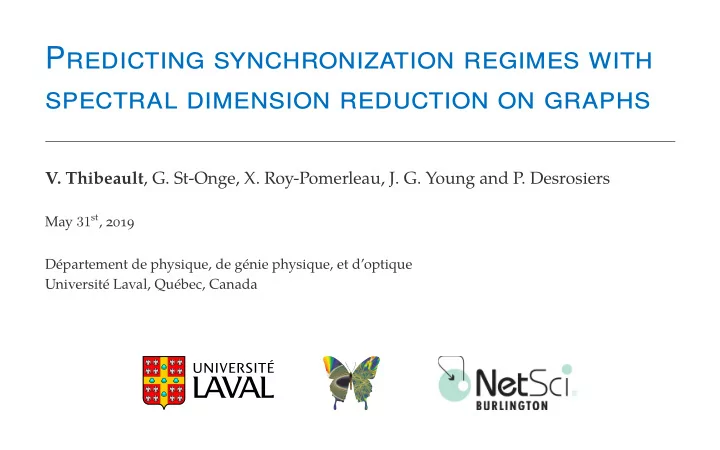

Predicting synchronization regimes with spectral dimension reduction on graphs V. Thibeault , G. St-Onge, X. Roy-Pomerleau, J. G. Young and P. Desrosiers May 31 st , 2019 Département de physique, de génie physique, et d’optique Université Laval, Québec, Canada
Complex systems 1
Complex systems 1
Complex systems 1
Goal We want to analyze this type of dynamics N dz j � dt = F ( z j ) + A jk G ( z j , z k ) j =1 2
Goal We want to analyze this type of dynamics N dz j � dt = F ( z j ) + A jk G ( z j , z k ) j =1 � z j can be complex C 2
Goal We want to analyze this type of dynamics N dz j � dt = F ( z j ) + A jk G ( z j , z k ) j =1 � z j can be complex C � N ≫ 1 coupled equations 2
Goal We want to analyze this type of dynamics N dz j � dt = F ( z j ) + A jk G ( z j , z k ) j =1 � z j can be complex C � N ≫ 1 coupled equations � F and G are often nonlinear 2
Goal We want to analyze this type of dynamics N dz j � dt = F ( z j ) + A jk G ( z j , z k ) j =1 � z j can be complex C � N ≫ 1 coupled equations � F and G are often nonlinear � A jk � = constant ∀ j, k ∈ { 1 , ..., N } 2
Goal We want to analyze this type of dynamics N dz j � dt = F ( z j ) + A jk G ( z j , z k ) j =1 � z j can be complex C � N ≫ 1 coupled equations � F and G are often nonlinear � A jk � = constant ∀ j, k ∈ { 1 , ..., N } These dynamical systems are often : � very hard to analyze mathematically 2
Goal We want to analyze this type of dynamics N dz j � dt = F ( z j ) + A jk G ( z j , z k ) j =1 � z j can be complex C � N ≫ 1 coupled equations � F and G are often nonlinear � A jk � = constant ∀ j, k ∈ { 1 , ..., N } These dynamical systems are often : � very hard to analyze mathematically � quite long to integrate numerically Possible solution : Reduce the number of dimensions of the dynamical system. 2
3
3
3
3
3
We don’t want to lose the graph properties by doing the dimension reduction. 4
We don’t want to lose the graph properties by doing the dimension reduction. Let’s use the spectral graph theory to find M ! 4 See [Laurence et al, Spectral Dimension Reduction of Complex Dynamical Networks , Phys. Rev. X (2019)]
Spectral weight matrix M 5
Spectral weight matrix M 5
Spectral weight matrix M 5
Spectral weight matrix M 5
6
Can we predict synchronization regimes with the spectral dimension reduction? 7
Synchronization predictions 8
Synchronization predictions 8
Synchronization predictions 8
Synchronization predictions 8
Bonus Decipher the influence of the SBM on synchronization 9
Synchronization in the Cowan-Wilson model 10
Synchronization in the Cowan-Wilson model 10
Synchronization in the Cowan-Wilson model 10
Synchronization in the Cowan-Wilson model 10
Synchronization in the Cowan-Wilson model 10
Summary � Spectral graph theory allows to reduce successfully multiple synchronization dynamics 11
Summary � Spectral graph theory allows to reduce successfully multiple synchronization dynamics � Detectability of the SBM delimits synchronization regions in the Cowan-Wilson dynamics 11
Summary � Spectral graph theory allows to reduce successfully multiple synchronization dynamics � Detectability of the SBM delimits synchronization regions in the Cowan-Wilson dynamics Typical Netsci message : Structure influences the dynamics! 11
Acknowledgements Thank you! Supervisors : Patrick Desrosiers and Louis J. Dubé Colleagues : Guillaume St-Onge, Xavier Roy-Pomerleau, Charles Murphy, Jean-Gabriel Young, Edward Laurence, Antoine Allard Preprint : Coming soon Contact : vincent.thibeault.1@ulaval.ca 12
Appendix : Advantages of the spectral dimension reduction Dimension reduction in synchronization � Watanabe-Strogatz (1993) � Ott-Antonsen (2008) � Spectral (2018-2019) ***original approach*** Advantages of the spectral dimension reduction : � N < ∞ � Systematic reduction of dynamics on graphs � Few hypothesis � Not restricted to synchronization dynamics 13
Recommend
More recommend